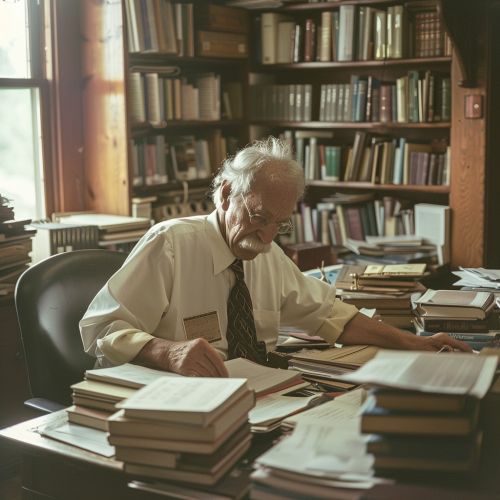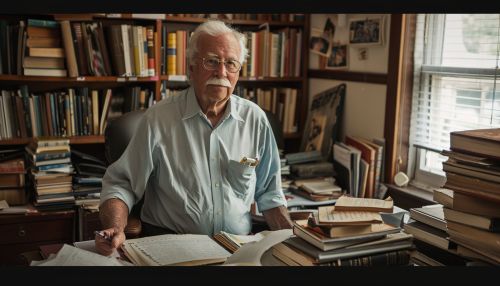Ward Goodenough: Difference between revisions
(Created page with "== Early Life and Education == Ward Hunt Goodenough was born on May 30, 1919, in Cambridge, Massachusetts. He was the son of Esther Hunt and Erwin Ramsdell Goodenough, a prominent historian of religion. Goodenough's early exposure to academic life and intellectual discussions at home significantly influenced his future career. He attended Groton School, a prestigious preparatory school, before enrolling at Cornell University. At Cornell, he majored in anthropology and g...") |
No edit summary |
||
| Line 63: | Line 63: | ||
[[Category:Linguistic Anthropologists]] | [[Category:Linguistic Anthropologists]] | ||
[[Image:Detail-79339.jpg|thumb|center|Photograph of Ward Goodenough in his office, surrounded by books and papers.|class=only_on_mobile]] | |||
[[Image:Detail-79340.jpg|thumb|center|Photograph of Ward Goodenough in his office, surrounded by books and papers.|class=only_on_desktop]] | |||
Latest revision as of 03:25, 18 May 2024
Early Life and Education
Ward Hunt Goodenough was born on May 30, 1919, in Cambridge, Massachusetts. He was the son of Esther Hunt and Erwin Ramsdell Goodenough, a prominent historian of religion. Goodenough's early exposure to academic life and intellectual discussions at home significantly influenced his future career. He attended Groton School, a prestigious preparatory school, before enrolling at Cornell University. At Cornell, he majored in anthropology and graduated with a Bachelor of Arts degree in 1940. He continued his studies at Yale University, where he earned his Ph.D. in anthropology in 1949 under the mentorship of George P. Murdock.
Academic Career
Early Work
Goodenough's early academic work focused on the ethnography and social organization of the Trukese (now Chuukese) people of Micronesia. His dissertation, "Property, Kin, and Community on Truk," was a comprehensive study of the social structures and cultural practices of the Trukese. This work laid the foundation for his later contributions to the field of anthropology, particularly in the areas of kinship and social organization.
Contributions to Kinship Studies
Goodenough made significant contributions to the study of kinship systems. He developed a formal method for analyzing kinship terminologies, which he called "componential analysis." This method involves breaking down kinship terms into their constituent components to understand the underlying structure of kinship systems. His work in this area was groundbreaking and influenced subsequent research in kinship studies.
Cognitive Anthropology
One of Goodenough's most notable contributions to anthropology was his work in cognitive anthropology. He was a pioneer in this subfield, which focuses on understanding how people perceive and categorize their world. Goodenough argued that culture is a system of knowledge that individuals use to interpret their experiences and guide their behavior. His book "Culture, Language, and Society" (1981) is considered a seminal work in cognitive anthropology.
Linguistic Anthropology
Goodenough also made important contributions to linguistic anthropology. He was interested in how language reflects and shapes social relationships and cultural practices. His research on the Trukese language provided valuable insights into the relationship between language and culture. He also explored the role of language in socialization and the transmission of cultural knowledge.
Teaching and Mentorship
Throughout his career, Goodenough was a dedicated teacher and mentor. He taught at the University of Pennsylvania for over three decades, where he influenced many students who went on to become prominent anthropologists. He was known for his rigorous approach to teaching and his commitment to fostering critical thinking and intellectual curiosity in his students.
Major Publications
Goodenough authored numerous books and articles throughout his career. Some of his most influential works include:
- "Property, Kin, and Community on Truk" (1951)
- "Description and Comparison in Cultural Anthropology" (1970)
- "Culture, Language, and Society" (1981)
- "Toward a Theory of Culture" (1981)
These publications have had a lasting impact on the field of anthropology and continue to be widely cited by scholars.
Awards and Honors
Goodenough received numerous awards and honors in recognition of his contributions to anthropology. He was elected to the American Academy of Arts and Sciences and the National Academy of Sciences. He also received the Distinguished Service Award from the American Anthropological Association and the Franz Boas Award for Exemplary Service to Anthropology.
Personal Life
Goodenough was married to Ruth Gallagher, with whom he had three children. He was known for his modesty and dedication to his family. Despite his many professional accomplishments, he remained humble and focused on his work.
Legacy
Ward Goodenough's contributions to anthropology have had a profound and lasting impact on the field. His innovative approaches to the study of kinship, culture, and language have influenced generations of anthropologists. His work continues to be relevant and is frequently cited in contemporary anthropological research.
See Also
- George Peter Murdock
- Ethnography
- Kinship
- Cognitive Anthropology
- Linguistic Anthropology
- Trukese Language
References


